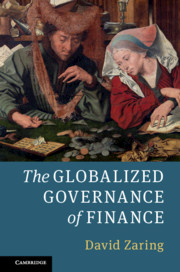
-
Select format
-
- Publisher:
- Cambridge University Press
- Publication date:
- November 2019
- December 2019
- ISBN:
- 9781108594295
- 9781108475518
- 9781108468596
- Dimensions:
- (228 x 152 mm)
- Weight & Pages:
- 0.41kg, 178 Pages
- Dimensions:
- (228 x 152 mm)
- Weight & Pages:
- 0.29kg, 178 Pages
- Subjects:
- Financial Law, Law, Business Ethics, Management
You may already have access via personal or institutional login- Subjects:
- Financial Law, Law, Business Ethics, Management
Book description
Big banks are capable of wreaking havoc on the global economy, and governments have often felt powerless to stop them. Regulators have responded by developing coordinated programs to handle banks, insurers, broker dealers, shadow banks and other businesses that can blow up in a crisis. This program began informally and undemocratically, and has developed into something much more organized, formalized and predictable, even though it has never been legally enforceable. David Zaring examines the realities of the current international financial system and concludes that in fact this is a well-ordered and functioning regulatory environment: the international financial system enjoys a substantial degree of compliance, and operates predictably and harmoniously. As a result, perhaps this could serve as a paradigm for future global governance. Zaring explores three aspects of international financial regulation that can inform global governance: harmonization through rules, cooperation on enforcement and agreement on fundamental principles.
Reviews
‘The Globalized Governance of Finance is an expansive and, at times, colorful portrayal of the ‘legalish' realm of global financial regulation. It provides a coherent and modern account of the world that lawyers and institutions experience. It is well worth a read.’
Verity Winship Source: Jotwell
Contents
Metrics
Altmetric attention score
Full text views
Full text views help Loading metrics...
Loading metrics...
* Views captured on Cambridge Core between #date#. This data will be updated every 24 hours.
Usage data cannot currently be displayed.
Accessibility standard: Unknown
Why this information is here
This section outlines the accessibility features of this content - including support for screen readers, full keyboard navigation and high-contrast display options. This may not be relevant for you.
Accessibility Information
Accessibility compliance for the PDF of this book is currently unknown and may be updated in the future.


